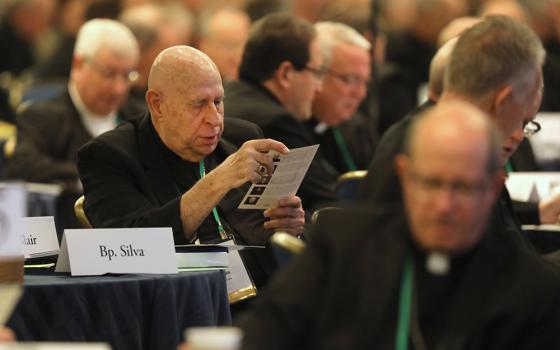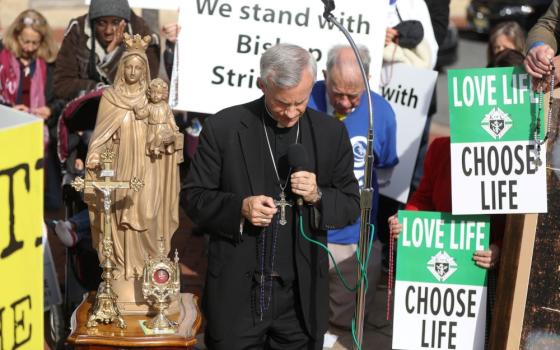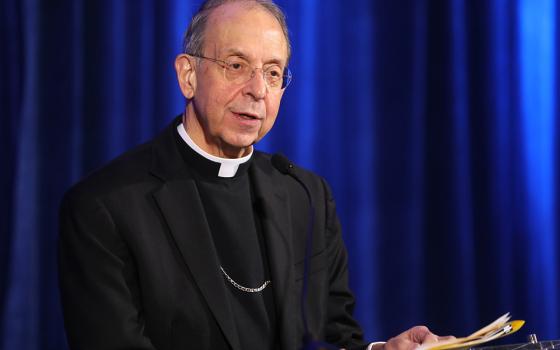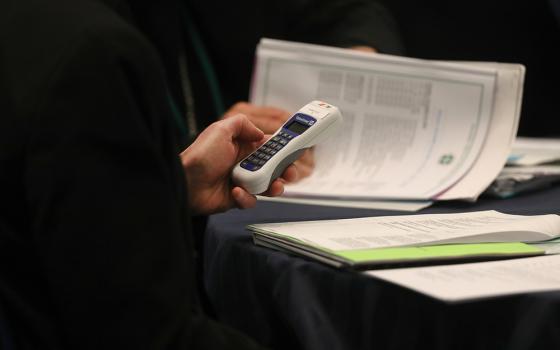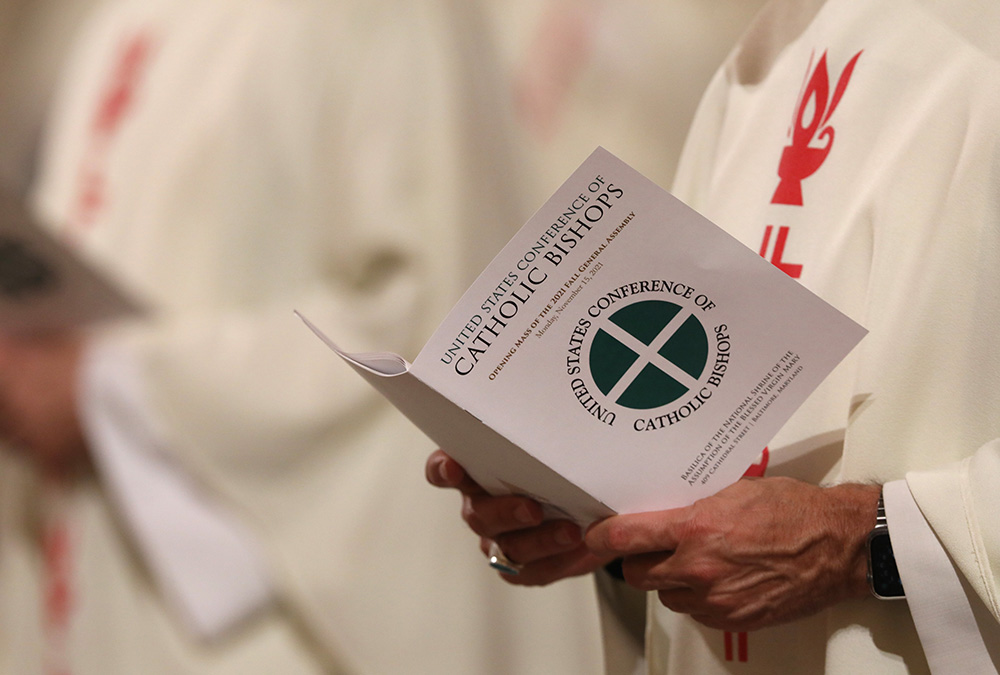
A bishop holds a booklet as he attends Mass in a file photo taken during the 2021 fall general assembly of the U.S. Conference of Catholic Bishops. (CNS/Bob Roller)
Every year, when one comes to report on the plenary meeting of the U.S. Conference of Catholic Bishops in Baltimore, you see some familiar faces and some new ones. One person I did not expect to see here was Bishop Joseph Strickland, who was relieved of the pastoral governance of his diocese on Saturday, Nov. 11. I figured that such a momentous and tragic event would cause him to go to a monastery and contemplate, or return to his family to center himself.
But Sunday night, sitting with friends at the James Joyce Pub around the corner from the Marriott hotel where the bishops' conference meets, there was Strickland. He was sitting with three people I did not recognize.
The poet for whom the pub is named famously said that being Catholic means, "Here comes everybody," which reflects a rather different ecclesiology from that of the neo-Jansenist bishop, so I found it odd he chose that location for a drink with friends.
I did not disturb Strickland. Others have done enough of that.
Strickland's removal hangs over the proceedings this week. The bishops with whom I have spoken are almost universally saddened by his reckless attacks on the Holy Father. None expressed any reservations about the decision to remove Strickland. It had to be done.
They recognize, however, that while a new bishop in Tyler, Texas, might be able to repair the damage within the diocese, the pernicious influence caused by Strickland's social media presence might continue. The boundaries of a diocese do not exist on X.
Advertisement
X, formerly known as Twitter, has dragged many people away from the norms that govern their guild. People engage social media and it can be addictive. It offers almost immediate gratification in the form of instantaneous replies to whatever one posts.
If you forget that the algorithms that govern it reward outrage not wisdom, you can easily find yourself wrapped up in a whirlwind of conspiracy theorists and crackpot ideas. Especially during the isolation required to combat the pandemic, it was a lifeline for many — but a dangerous one.
Social media offers so much information with so few filters. Still, you would think a Catholic bishop would be leery of any means of communication that lack all mediation: The church exists to mediate the divine revelation. Its ministers need to mediate its doctrines. Its teachers mediate its teachings.
As early as the Acts of the Apostles, we see that the whole governs the parts, that the apostles act in a collegial manner and submit to the decisions of the group even while they retain their distinctive qualities. This balancing between the individual person and culture and the communion of the whole in the Catholic Church has persisted even as the church has become a global communion.
As I noted yesterday, Strickland is not the only bishop with reservations about the direction in which Pope Francis is leading the church. I call it "Francis Derangement Syndrome."
It is rooted, first and foremost, in a gross misunderstanding of the two previous pontificates of John Paul II and Benedict XVI. Massimo Borghesi's important book Catholic Discordance: Neoconservatism vs. the Field Hospital Church of Pope Francis tells the tale of how too many Americans accepted an interpretation of recent papal teaching that aimed to force those two complex pontiffs into a neoconservative mold, and then claim that particular mold was eternal Catholic teaching. I reviewed that book here and here.
The U.S. bishops will only overcome their divisions when they let Jesus out, and follow him into the culture of today.
The solution to the divisions within the hierarchy will not be found primarily through internal discussions. The bishops must find the answers outside the sacristy — or the Baltimore hotel ballroom where they are meeting this week. As then-Cardinal Jorge Bergoglio said to his brother cardinals in 2013, shortly before they elected him pope:
The evils that, over time, happen in ecclesial institutions have their root in self-referentiality and a kind of theological narcissism. In Revelation, Jesus says that he is at the door and knocks. Obviously, the text refers to his knocking from the outside in order to enter but I think about the times in which Jesus knocks from within so that we will let him come out. The self-referential church keeps Jesus Christ within herself and does not let him out.
The U.S. bishops will only overcome their divisions when they let Jesus out, and follow him into the culture of today.
Chicago Cardinal Blase Cupich pointed a way forward in remarks at the recent Rerum Novarum Awards celebration held at the seminary in Mundelein, Illinois. The awards honor those who apply Catholic social teachings today.
Cupich noted some of the challenges of our time: "the rise of artificial intelligence, globalization, the need to integrate a migrant population into our workforce and remain attentive to environmental challenges that threaten our very survival."
Addressing these massive problems, he said, requires that "we consider labor and social issues in the same context and move away from a previous approach that viewed them as unrelated and topics to be treated in isolation. A more holistic, comprehensive approach to work, education, training new workers and all of life better reflects Catholic social teaching's principles and its moral framework on the rights of workers, the dignity of human work and the common good."
This holistic dialogue between the "timeless principles" of Catholic teaching with the lived situation of the people of our time is analogous to what the bishops must begin this week if they are to overcome their divisions. Timeless principles do not evangelize themselves. And they become a museum piece if they are left on the mantle, unmovable and unchanging.
"To live is to change, and to be perfect is to have changed often," wrote the great St. John Henry Newman. The bishops can find unity to the extent that they let Jesus out of the sacristy and the ballroom, and follow him to the factory floor and the soup kitchen and the office building. They will find unity when they follow the ecclesiology of the Irish poet — "here comes everybody" — not the ecclesiology of the deposed Texas bishop.
Our Catholic principles are timeless. We aren't. If the church does not get out of itself, it becomes, as Francis warned, self-referential and theologically narcissistic. It becomes prone to the crackpot conspiracy theorists and their ilk. It dies.





